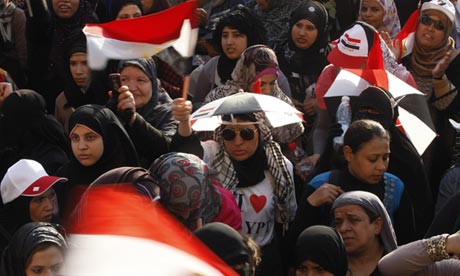Violence Against Women
Source: Guardian
A mob of hundreds of men assaulted women holding a march demanding an end to sexual harassment in Cairo, as attackers overwhelmed male supporters and molested several of the marchers in Tahrir Square.

Some victims said it appeared to have been an organised attempt to drive women out of demonstrations and trample the pro-democracy protest movement.
The attack on Friday follows a spate of smaller-scale assaults on women in Tahrir Square, the epicentre of the uprising that forced former president Hosni Mubarak to step down last year.
Earlier in the week, an Associated Press reporter witnessed around 200 men assault a woman who eventually fainted before others came to her aid.
Friday's march demanded an end to all sexual assaults. Around 50 women participated, surrounded by a larger group of male supporters who joined hands to form a protective ring around them. The protesters carried posters and chanted. After the marchers entered a crowded corner of the square, a group of men waded into the women, heckling them and groping them. The attackers chased the the marchers as they tried to flee. Several women were cornered against railings and groped, according to reports. Eventually, the women found refuge in a nearby building.
"After what I saw and heard today I am furious at so many things." wrote Sally Zohney, one of the event's organisers on Twitter.
Ahmed Mansour, a 22 year-old male medical student who took part in the march, said: "Some people think it is targeted to make women hate coming here."
During the uprising against Mubarak last year, women said they briefly experienced a "new Egypt". Women participated as activists, protesters, medics and frontline fighters against the security forces. They have continued to play a leading role over the past 15 months. However, assaults on women protesters have been common, mainly perpetrated by men opposed to their presence and the security forces. Lara Logan, a US correspondent for CBS television, was sexually assaulted by a mob in Tahrir Square on the day Mubarak stepped down, as hundreds of thousands of Egyptians celebrated.
In a defining image of state violence against women, soldiers dispersing a protest in December were captured on video stripping a woman's top off and stomping on her chest, as other troops pulled her by the arms across the ground. That incident prompted a march by 10,000 women through Cairo.
In contrast, the small size of Friday's march could reflect the fear felt by women in the square.
Sexual harassment of women, including against those who wear the hijab, is common in Cairo. A 2008 report by the Egyptian Centre for Women's Rights said two-thirds of women in the country experienced sexual harassment on a daily basis. A string of mass assaults on women in 2006 during Eid, the feast following Ramadan, prompted police to increase patrols.
"Women activists are at the core of the revolution," said Ahmed Hawary, who attended Friday's protest. "They are the courage of this movement. If you break them, you break the spirit of the revolution."
